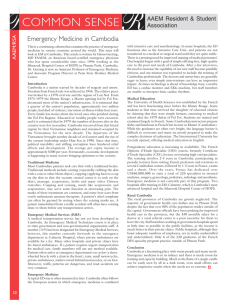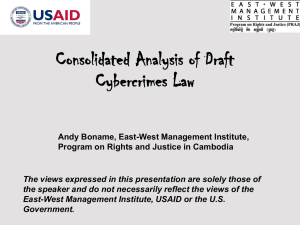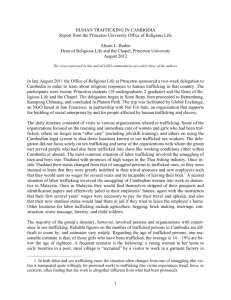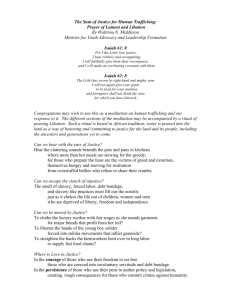Minutes of Last Stakeholder Meeting
advertisement
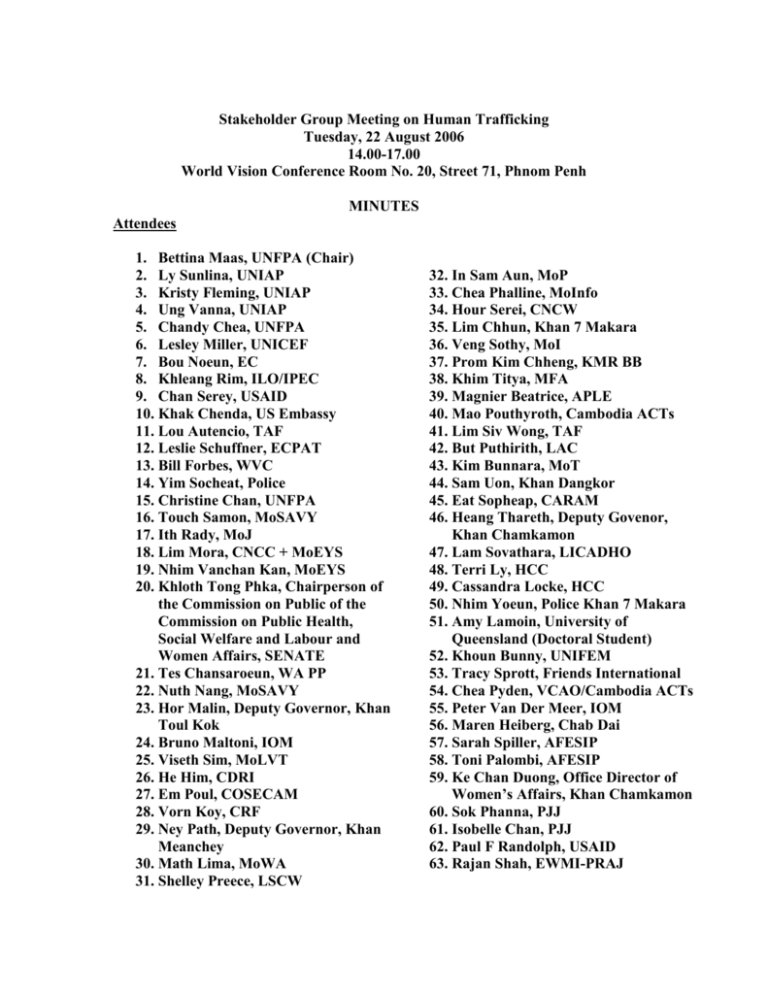
Stakeholder Group Meeting on Human Trafficking Tuesday, 22 August 2006 14.00-17.00 World Vision Conference Room No. 20, Street 71, Phnom Penh MINUTES Attendees 1. Bettina Maas, UNFPA (Chair) 2. Ly Sunlina, UNIAP 3. Kristy Fleming, UNIAP 4. Ung Vanna, UNIAP 5. Chandy Chea, UNFPA 6. Lesley Miller, UNICEF 7. Bou Noeun, EC 8. Khleang Rim, ILO/IPEC 9. Chan Serey, USAID 10. Khak Chenda, US Embassy 11. Lou Autencio, TAF 12. Leslie Schuffner, ECPAT 13. Bill Forbes, WVC 14. Yim Socheat, Police 15. Christine Chan, UNFPA 16. Touch Samon, MoSAVY 17. Ith Rady, MoJ 18. Lim Mora, CNCC + MoEYS 19. Nhim Vanchan Kan, MoEYS 20. Khloth Tong Phka, Chairperson of the Commission on Public of the Commission on Public Health, Social Welfare and Labour and Women Affairs, SENATE 21. Tes Chansaroeun, WA PP 22. Nuth Nang, MoSAVY 23. Hor Malin, Deputy Governor, Khan Toul Kok 24. Bruno Maltoni, IOM 25. Viseth Sim, MoLVT 26. He Him, CDRI 27. Em Poul, COSECAM 28. Vorn Koy, CRF 29. Ney Path, Deputy Governor, Khan Meanchey 30. Math Lima, MoWA 31. Shelley Preece, LSCW 32. In Sam Aun, MoP 33. Chea Phalline, MoInfo 34. Hour Serei, CNCW 35. Lim Chhun, Khan 7 Makara 36. Veng Sothy, MoI 37. Prom Kim Chheng, KMR BB 38. Khim Titya, MFA 39. Magnier Beatrice, APLE 40. Mao Pouthyroth, Cambodia ACTs 41. Lim Siv Wong, TAF 42. But Puthirith, LAC 43. Kim Bunnara, MoT 44. Sam Uon, Khan Dangkor 45. Eat Sopheap, CARAM 46. Heang Thareth, Deputy Govenor, Khan Chamkamon 47. Lam Sovathara, LICADHO 48. Terri Ly, HCC 49. Cassandra Locke, HCC 50. Nhim Yoeun, Police Khan 7 Makara 51. Amy Lamoin, University of Queensland (Doctoral Student) 52. Khoun Bunny, UNIFEM 53. Tracy Sprott, Friends International 54. Chea Pyden, VCAO/Cambodia ACTs 55. Peter Van Der Meer, IOM 56. Maren Heiberg, Chab Dai 57. Sarah Spiller, AFESIP 58. Toni Palombi, AFESIP 59. Ke Chan Duong, Office Director of Women’s Affairs, Khan Chamkamon 60. Sok Phanna, PJJ 61. Isobelle Chan, PJJ 62. Paul F Randolph, USAID 63. Rajan Shah, EWMI-PRAJ Agenda Items Welcome and introductions The Chair, Bettina Maas, welcomed attendees and invited them to introduce themselves. Review and adoption of agenda The agenda was adopted without amendment. Review and adoption of minutes The minutes were adopted without further amendment. Presentation on the Outcomes of the COMMIT Senior Officials Meeting in Lao, 10-11 August 2006 and the Workshop on the Bilateral Agreement on Prosecution of Human Traffickers in Siem Reap, 20-21 July, 2006 His Excellency Ith Rady, Under Secretary of State for Ministry of Justice and Deputy Chair of the Cambodian COMMIT Taskforce, presented on the outcomes of the COMMIT SOM Strategic Planning and Prioritisation Meeting held in Lao. The conference was attended by representatives from all of the six GMS countries. The representatives from the Cambodian Government were HE Ith Rady and HE Madam You Ay. The purpose of the meeting was to develop the Regional Implementation Workplan for October 2006 to December 2007, reflecting national priorities, activities, timeframes and responsibilities identified by the six governments within the COMMIT Sub-regional Plan of Action. The meeting saw revisions made to the Regional Workplan to combat trafficking, including reducing the number of Project Proposal Concepts from 12 to 10 by merging some of the original concepts. The meeting also established country priorities for inclusion into the regional workplan and to use in the development of National Workplans to combat trafficking. Cambodia’s priorities identified at the meeting were: 1. National Training Program on Human Trafficking 2. Implementation of Bilateral MOUs 3. Identification of Victims and Apprehensions of Perpetrators 4. Developing Legal Frameworks and Mutual Legal Assistance 5. Post-harm Support, including Economic and Social Support for Victims and Reintegration 6. Support Activities to prevent exploitation in tourism sector 7. Ensuring safe and time repatriation of victims 8. Addressing exploitative brokerage practices 9. Finalising and Mainstreaming National Plan of Action Follow-up activities from this workshop will see the finalisation of the Regional Workplan to combat trafficking and the creation of National Workplan to combat trafficking based on identified priorities. A consultative workshop with UN Agencies, NGOs and Civil Society is being planned to discuss collaborative implementation of priorities. HE Ith Rady also presented on the outcomes of the Workshop on the Guidelines for Cooperation between Cambodia and Thailand on the Criminal Justice Process of Trafficking-Related Crimes held in Siem Reap. The purpose of the workshop was to review the Guidelines of Cooperation and reach bilateral consensus. Many revisions were made to the Guideline and they are due to be finalised and distributed within a few months. The Guidelines outline 7 main areas: The Scope of Bilateral Agreement The Basic Principles of Cooperation The Basic Principles on Confidentiality of Information and Intelligence The Standards and Selected Procedures for the Prosecution Process The Cooperation between CJA and VSA in cross-border cases The Capacity Building Requirements The Requirements to Modify the Guidelines When the Guidelines are finalised and disseminated, the next stage is to ensure smooth implementation of the Guidelines at all levels. Progress Report on the Five Year National Plan of Action Against Trafficking and Sexual Exploitation of Children 2006-2010 Mr Lim Mora, Official from the Cambodian National Council for Children, updated the meeting on the progress of the Second NPA for Cambodia. He explained the seven steps in process of finalising and adopting the NPA. This process includes: assessment and evaluation of the first NPA; discussion and consultation about the requirements of the second NPA with the relevant ministries and agencies; collection and consolidation of recommendations; national meetings to draft NPA and to decide on the matrix form; discussion and consideration of NPA by Cambodia National Council for Children (CNCC); and then submission of the second NPA to Council of Ministers for final decision and approval from the Cambodia Government. Mr. Lim also stated about the contents of NPA which is divided into Policy and Cooperation; Prevention; Criminal Justice; Protection, rehabilitation and reintegration; and the Special Programme. Progress Report on the Agreement between Government and Victim-Support Agencies regarding Trafficking in Persons Mr Touch Samon, Deputy Director General of Ministry of Social Affairs, Veterans and Youth and member of Cambodian COMMIT Taskforce informed the meeting about the Agreement that has been developed between Government and Victim-Support Agencies. For the purpose of assisting victims of human trafficking effectively, there is a need to have the National Guidelines between the Cambodian Government and victims support agencies. The guideline has been developed and finalized by many meetings by the relevant ministries, NGOs and development agencies with support from ARCPPT. It is expected to be signed by the end of September 2006. The guideline is divided into 13 chapters and 82 articles. Comments /Questions and Discussion Lesley Miller from UNICEF inquired about when the NPA is expected to be finished, who has to approve it for it to be official, and is this second NPA broadening its scope to cover all victims of human trafficking, not just children. Lim Mora from CNCC announced that the NPA is due to be made public at the end of November 2006. The 2nd NPA is not cover only the children but adult. Bettina Maas from UNFPA asked how the NPA will fit with Cambodia’s COMMIT priorities. HE Ith Rady emphasised that the Royal Government of Cambodia prioritises coordination and will try its best to ensure a smooth and coordinated implementation of these government processes. Ly Sunlina from UNIAP clarified that the Cambodia COMMIT Priority Work Plan is designed for one year and three months work plan (from October 2006 to December 2007) which is reflected to the COMMIT Sup- Regional Plan of Action and to the five year Cambodia 2nd NPA. UNFPA suggested that UNIAP compile all National Plans / Priorities / Procedures / Guidelines for all stakeholders and government to compare. This compendium of national policies will help us understand the holistic approach of government against trafficking. Kristy Fleming from UNIAP agreed with this suggestion. Coffee Break Action Pour Le Enfants’ Research Series on Street Paedophilia in Cambodia Beatrice Magnier, Director of APLE, presented the findings of three research reports produced by APLE over the last year. The first report entitled Street Pedophilia in Cambodia – A survey on Phnom Penh’s suspects and victims found that the technique of “grooming”is commonly used by perpetrators to prepare victims and create a relationship of confidence and friendship with the children. It also found that facilitators and intermediaries were often used in the recruitment process. The second report Street-based Child Sexual Exploitation in Cambodia: An Overview of 7 Provinces found that there was no proactive monitoring of potential sex offenders and that grooming and developing relationships with children and their families was a country wide trend in recruitment. It also found the need for APLE to open an office in Siem Reap and undertake ad-hoc monitoring in Battamband, Kep/Kampot, Koh Kong and Banteay Meanchey. The third report presented was the Study on Cambodia’s Criminal Justice System – with Focus on Prosecuting Foreign Child Sex Offenders. This study found the gaps in the laws to be no consistent age of consent, no definition of the term “debauchery”, and no law or provision in Cambodian legislation incriminating child pornography. The report also gives examples of deviations between the criminal procedure in the law and the criminal procedure in practice. APLE are planning a future study to explore the profile of victims of street pedophilia. Human Trafficking Library Kristy Fleming, Project Advisor for UNIAP, informed the meeting of a new Human Trafficking Information Centre at the Cambodian Development Research Institute (CDRI) Library. UNIAP have donated over 300 books relating to human trafficking to CDRI Library. Mr He Hin, Library Manager, explained that the library is open to the public and also receives books from the World Bank, ADB, UN Research Institute for Social Development and the Tonle Sap Initiative. A list of the books in the human trafficking section was distributed to members of the meeting. Kristy urged members to peruse the list and note if any publications are missing and asked members donate missing publications to the Information Centre. Library Address: #56, St 315, Toul Kork, Phnom Penh Opening Hours: Monday to Friday (7:30am-12noon and 2pm to 5pm) Progress and Process of the Cambodian Anti-Child Trafficking Campaign Mr Chea Pyden, Country Focal Point of the Cambodian ACT Campaign, informed the meeting about the process of the Regional Anti-Child Trafficking Campaign and introduced them to the ACT Guidelines developed by this process. Mr. Chea explained the projects of Cambodia Acts at national level such as community education, Victims support and referral system, Law enforcement, Building community towards good life for children. He also stated that at the regional level, the Asia Act has coordinated work with seven countries (Indonesia, Philippines, Burma, Laos, Thailand, Vietnam and Cambodia). These countries have developed Regional Guidelines on victim's support of human trafficking and each country is working towards adapting the guidelines into the national level. Cambodia is now starting to discuss this Guideline. Cambodia National Council for Children (CNCC) is discussing the ACT National Guidelines and will submit it to the Council Minister for approval by the Cambodia Government. Comments/Questions Lim Sihong, The Asia Foundation, inquired as to why Cambodia needs to have two national guidelines on victim's support of human trafficking. UNFPA identified the need for a national consultative workshop be held to clarify how all the national procedures connect. Mr Chea Pyden from Cambodian ACT Campaign reiterated the need to connect guidelines and urged the process to also consider the Guidelines promoted by the ACT Campaign. Touch Samon commented that, because the ACT Guidelines are developed by NGOs and not government they must go to Council of Ministers and then other ministries for revision before being considered for adoption or inclusion into National processes. UNIAP suggested these two key players should coordinate and facilitate to make sure there is the need to have two guidelines, and what is the different between the two. USAID’s New Anti-Trafficking Initiatives Mr Paul Randolph, Technical and Project Coordinator for the Office of General Development in USAID, announced to the meeting USAID’s new counter trafficking in persons program in Cambodia. It is a 3 yr program, costing $4.5 million, to be implemented by the Asia Foundation. It covers all areas of the anti-human trafficking campaign: prevention, protection, prosecution, and policy. It will be implemented in close cooperation with the ministries involved in anti-trafficking campaigns. The official launching of the project will be held in mid-September. Other Business Lesley Miller from UNICEF announced that this Thursday and Friday, 24-25th of August, the Ministry of Women’s Affairs, IOM and UNICEF will be conducting a Workshop on the Bilateral Agreement between Cambodia and Vietnam on Human Trafficking. Only Cambodian authorities from Phnom Penh and relevant provinces close to the Vietnamese border will be participating. It will be held at the Ministry of Women’s Affairs. Bettina Maas announced that UNFPA plan to launch their State of the World Population Report on Women and International Migration on the 6th of September. Chair reminded participants to complete the Stakeholder Meeting Member Survey to give feedback on the structure and content of Stakeholder Meetings and return to UNIAP at the end of the meeting. Next Stakeholder Group meeting The next meeting was set for Tuesday 21 November, 2006
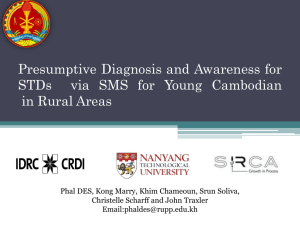
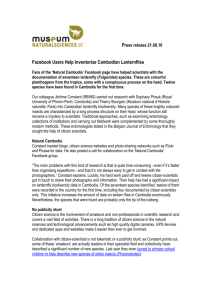
![Cambodian New Year - Rotha Chao [[.efolio.]]](http://s2.studylib.net/store/data/005298862_1-07ad9f61287c09b0b20401422ff2087a-300x300.png)

